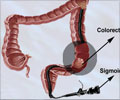Four genetic variations that are associated with an increased risk of colorectal cancer have been discovered by scientists.

The genomewide-association study was conducted in two phases. The first involved rapidly scanning complete sets of blood DNA from 12,696 people with colorectal cancer or a precancerous condition called adenoma. This data was then compared to the same set of variants from 15,113 healthy controls of European descent.
Of 2.7 million genetic variants identified, the 10 most statistically significant mutations associated with colorectal cancer were then further analyzed in a follow-up genomewide-association study of 3,056 colorectal cancers or adenomas and colon-tissue samples from 6,658 healthy controls of European and Asian descent.
The research team uncovered mutations in the following genes – all genetic variants that previously had not been associated with colorectal cancer:
- NABP – a gene involved in DNA repair
- LAMC1 – the second gene in the laminin gene family found to be associated with colorectal cancer
- CCND2 – a gene involved in cell-cycle control, which is a key control mechanism to prevent cancer development
- TBX3 – a gene transcription factor that targets a known colorectal cancer pathway
If a person carries one or two copies of any of these genetic variants, their risk of colorectal cancer is increased by 10 percent to 40 percent compared to a person who does not harbor such DNA genetic variants, Peters said.
"These findings could potentially lead to new drug targets and, in combination with previously identified genetic and environmental risk factors, identify subgroups of the population that can benefit most from colorectal-cancer screening and could be targeted for early or more frequent endoscopy, a very effective screening tool for colorectal cancer," said Peters, a member of the Public Health Sciences Division at Fred Hutch.
Advertisement















